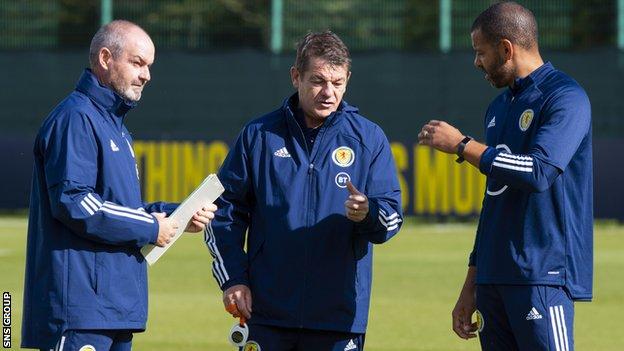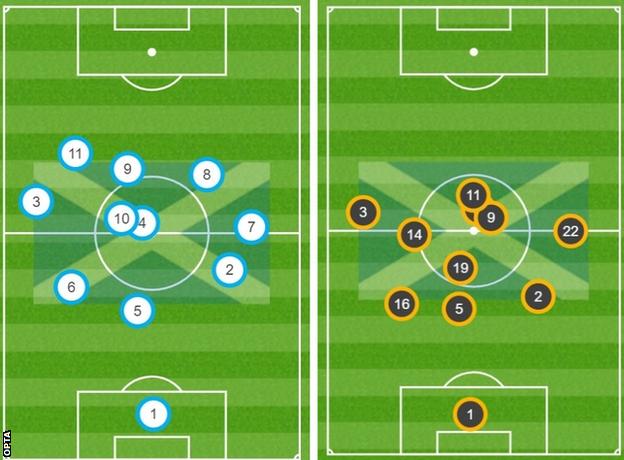
[ad_1]

In what is arguably Scotland’s biggest game for 17 years, Steve Clarke will name his squad on Tuesday for Scotland’s crucial European Championship play-off with Israel.
There are unlikely to be many changes to the group that drew 1-1 with the Israelis, then beat a makeshift Czech Republic side earlier this month, but what have we learned about how the team might look at Hampden on 8 October?
BBC Scotland takes a look.

David Marshall is now the national team’s undisputed number one. The Derby County keeper made a number of crucial saves in the victory over the Czech Republic, and has never let Scotland down in his 36 caps.
Recent depth in the goalkeeping position has dwindled, which means Rangers’ Jon McLaughlin is the only realistic challenger to Marshall’s spot. He appears to have lost his starting position at Ibrox to Allan McGregor despite a run of seven clean sheets to start the campaign, which makes overhauling Marshall almost impossible.

Now, this is where it gets interesting. Clarke experimented with a back-three in the last two games, with Scott McKenna, now of Nottingham Forest, and Scott McTominay playing both times. Kieran Tierney played as left centre-back against Israel, with Leeds captain Liam Cooper playing there in the Czech Republic.
McKenna, Tierney and Cooper all played reasonably well, but McTominay looked uncomfortable playing out of position, and was frequently exposed, most notably for the Czechs’ goal in the 2-1 win. Liam Palmer also acquitted himself well at right wing-back in the second match, providing the assist for Scotland’s equaliser.

Whether Clarke persists with the back-three or not, McKenna and captain Andrew Robertson look to be the only certainties in the defensive unit.
The rest boils down to the system, which itself is essentially a decision whether to include Tierney in an unnatural position, or simply leave him out. All in all, the recent games provided few answers.

The strongest area of the team, but one that has also suffered from inconsistency in selection. If fit, Ryan Christie – who has three goals and five assists in his last eight caps – surely deserves to start, while John McGinn is likely to be another starter given no player has been involved in more goals since Clarke took charge.
There may be room for another two central players depending on Clarke’s formation choice, and for balance those would likely be in holding roles. Ryan Jack plays that position effectively for Rangers, but might not be fit for the play-off, while McTominay has performed the role for Manchester United.
Callum McGregor has been used as a sitting midfielder for Scotland, but always looks more comfortable when playing in a freer role for Celtic.
Kenny McLean also made a decent case when he played as a six against the Czechs, where he made the second-most accurate passes of any Scotland player, the most interceptions, and won over 80% of his duels.
That leaves John Fleck and Stuart Armstrong (who plays further forward) from the last squad, neither of whom made a strong case when they played in Olomouc. Unlike in defence there are a wealth of options, but again few certainties.

Last time out we learned that Lyndon Dykes can be an effective number nine for Scotland. He came in for his debut against Israel and linked the play well, before going on to add a goal against the Czech Republic as he made a near-post run to finish from Palmer’s cross.
He has also managed two goals for QPR since his move south from Livingston. That form may just be rewarded by Clarke in the absence of other compelling options, but that is far from nailed on.
Oli McBurnie, who pulled out of the last squad through injury, and Oliver Burke are fighting each other for game time up front for Sheffield United in the Premier League and provide different options. But without recent goal-scoring form, neither has a compelling case to start.
The same could be said for Lawrence Shankland who, having missed six of Dundee United’s matches this season through injury, is yet to shine in Scotland’s top flight.
We learned nothing about the wide forward positions in the last double header because the 3-4-2-1 formation meant there were none. James Forrest is unlikely to be fit for the Israel game, and with Ryan Fraser still working his way to full fitness with Newcastle, there is no strong argument for incorporating wingers into the system.
[ad_2]
Source link